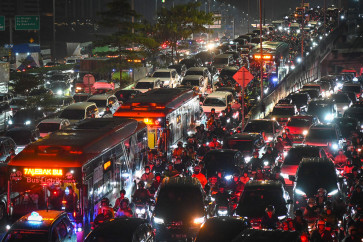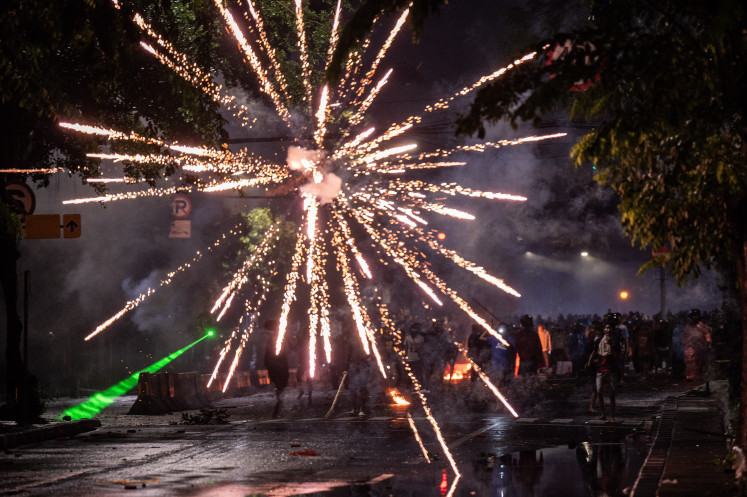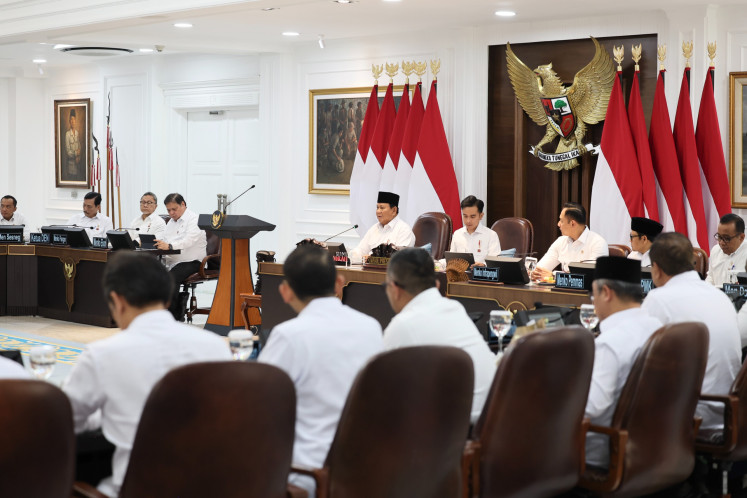Popular Reads
Top Results
Can't find what you're looking for?
View all search resultsPopular Reads
Top Results
Can't find what you're looking for?
View all search resultsTribunal: How (not) to get away with bloody murder
Viola Davis just made history by getting away with murder
Change text size
Gift Premium Articles
to Anyone
V
iola Davis just made history by getting away with murder.
Well no, she didn't actually. She made history by being the first black woman to win an Emmy for her role as the professor and defense attorney in ABC drama series How to Get Away with Murder.
But some people really do make history by getting away with murder. They don't get Emmys, they get something more formidable: impunity.
If getting an Emmy even once in a lifetime already counts as a worthy achievement, the impunity of these people is for a lifetime. Furthermore, this impunity allows them power, positions and possibilities for further abuse and atrocities. It also results in the perpetuation of a culture of political violence and denial.
Today, on Sept. 30th, Indonesia will be remembering 50 years of silence and injustice ' the 'commemoration' of what is known as the September 30 Movement (G30S) ' if one can call massacre a movement. The ensuing bloodbath in 1965 and 1966 targeted members of the now defunct Indonesia Communist Party (PKI), families, sympathizers, trade unionists, teachers, civil society activists and leftist artists, ethnic Chinese, sympathizers as well as innocent bystanders.
The perpetrators were led by the military, but the massacre was conducted by religious-based and civil society organizations. The killings ' considered the worst genocide since the Nazi holocaust ' claimed from 500,000 to 2 million lives, depending on whose statistics you believe.
Since Joshua Oppenheimer's diptych The Act of Killing (2012) and The Look of Silence (2014), which he claims to be his 'love letter to Indonesia', the tragedy of 1965-66 has again been brought to international attention.
The 50th commemoration of Indonesia's tragedy coincides with the 100th commemoration of the Armenian genocide (1915), which also has not yet been fully resolved. The genocides in both Indonesia and Armenia have been recognized by other states, but not by the perpetrators.
In the case of Armenia it was the Ottoman Turks who killed an estimated 1.5 million people and confiscated or destroyed their property.
In our case, the perpetrators are our compatriots, backed by the government. Will we suffer the same fate as the Armenians when we reach 2065, the 100th 'anniversary' of 1965?
In 2012, no less than the National Commission on Human Rights (Komnas HAM), produced a very detailed report on the massacre, following four years of investigations. They concluded that the communist purge amounted to a gross violation of human rights, and was a crime against humanity.
The government however rejected the findings and up to now has refused to issue an apology. This is despite the fact that President Joko 'Jokowi' Widodo mentioned the need for a national reconciliation to resolve past human rights abuses in his inaugural state-of-the-nation address last August. During the 2014 election campaign, even Jokowi was accused of being a communist. That's pretty close to home, isn't it, Mr. President?
People like Kivlan Zen, a retired military general, said that an apology by the government would give a green light to the reemergence of the PKI.
Hello?
Kivlan reminds me of Hiroo Onoda, a Japanese soldier who refused to believe that World War II was over, and remained hunkered down in the Philippines jungle for more than three decades. Hey, Kivlan, time to exit your jungle!
But, the past is past. Isn't it better to let bygones be bygones?
The problem is, it isn't. Past that is. Violent ant-communist sentiment is still well and alive.
The families and descendants of the victims of 1965-66 are still being targeted, until today. Some examples: In West Sumatra in March this year, a rampaging mob targeted 200 victims who were gathered to celebrate the 15th anniversary of YPKP 65, an advocacy group demanding justice for victims of the 1960s violence.
Similarly in Surakarta, Central Java, Islamic groups and the police cancelled a meeting by another victims' group, organized merely to talk about their health and how the state could support them.
However, the importance of recognizing the human rights abuses of 1965-66 is about our future, fate and identity as a nation. How can we move forward if we haven't healed our trauma? Other nations such as Germany, South Africa and Spain have at least met partial resolution through truth and reconciliation tribunals. That is why the Indonesian People's Tribunal (IPT 1965) was formed two years ago.
Kivlan, and members of Nahdlatul Ulama, the largest Islamic organization, are afraid that the IPT 1965 will drag individual military perpetrators and members of NU to trial.
This is not the aim of the IPT 1965. As Nursyahbani Katjasungkana, a human rights lawyer and the Tribunal coordinator told me, they only want to bring forth the notion of state responsibility.
But, as Aboeprijadi Santoso wrote in this newspaper, 'Any crime, political or otherwise, would normally be resolved at a formal state court. But when it comes to the 1965 atrocities ['¦] few, if any, expect the state will do the job and resolve its own 'crimes'. Hence, a people's tribunal ' being the only alternative ['¦] should pursue the efforts.'
How does the IPT intend to do its work concerning the 1965 events? It seeks to break open the taboos and veil that has obscured this humanitarian calamity through a series of events and publications both in Indonesia and overseas.
The 'verdict' of the IPT 1965, to be held Nov. 10-13, 2015 in The Hague, is of course a foregone conclusion. So what do they hope to achieve if the government has already rejected the findings of Komnas HAM, established by the state itself in 1993?
The answer is we don't know for sure.
What is certain is that, unlike Viola Davis, by constantly denying the heinous crimes from the 1965 genocide, Indonesians will not be making history.
We will simply be repeating it.
__________________________
The writer is the author of Julia's Jihad.










